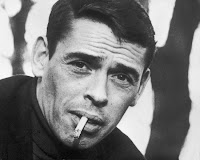Share on Google+:
Upstream Theater is presenting a
flawed but nevertheless interesting new production through January 27th of
Café Chanson, a new musical written and directed by Ken Page. The score consists of one new song by Mr. Page and his music director Henry Palkes. The rest of it is made up of (mostly) French popular songs from the 1920s through the early 1970s.
This is the second (and last) installment of a complete song list along with some background and random thoughts on some of the numbers. In cases where I had nothing intelligent to add about a particular song, I just listed it and left it alone.
The names in parentheses are the songwriters. In the few cases where the titles in the program were incorrect or misspelled, I’ve corrected them here. If there’s anything in here that I’ve gotten wrong, please let me know.
“Rain”
“Madame”
 |
| Mistinguett, circa 1927 |
“Mam’selle Josephine et Mistinguette” (Ken Page / Henry Palkes) In the show this is sung by The Man, the gay cross-dressing waiter at the Café, decked out in a flashy sequined Folies Bergère-style outfit. The Josephine of the title is, of course, Napoleon’s empress. Mistinguett (the final version of her stage name) was a celebrated French singer and actress of the early 20th century. Born Jeanne Bourgeois in 1875, she began her showbiz career at the age of 10, was appearing at the Casino de Paris by the age of 20, and went on to international celebrity. Her signature song, “Mon Homme” (1916) was not only a big hit for her but, in English translation (“My Man”) for Fanny Brice as well. She died in 1956.
“What Makes a Man (Comme ils dissent)” (Charles Aznavour) The great French singer/songwriter stirred up some controversy in 1972 with this sympathetic and tragic portrayal of a gay female impersonator.
 |
| Jacques Brel |
“I’m Not Afraid” (Rod McKuen / Jacques Brel) The original title of the song was “Fils de” (“Sons of”). McKuen’s lyrics are completely different. Both English versions have had their share of recordings over the years; I remember the Judy Collins version of “Sons of” with considerable affection. In Café Chanson, the McKuen version is sung by The Young Soldier and The Mademoiselle as they try to deal with the disintegration of their relationship.
“If You Go Away (Ne Me Quitte Pas)” (Jacques Brel) The version of this used in the show has lyrics by Rod McKuen. The original is more properly translated as “Don’t Leave Me.” Brel originally released the song on his 1959 LP “La Valse à Mille Temps
”. The song has been amazingly popular, with versions in nearly two dozen languages.
“La Fanette” (Jacques Brel) Another story of love and betrayal, a recurring Brel theme. A
1965 performance by Brel is heartbreaking in its intensity.
“Bonsoir Mademoiselle”
 |
| Charles Aznavour in 1978 |
“Yesterday When I Was Young ” (Charles Aznavour) Original French title: “Heir Encore” (“Only Yesterday”); the English version is by Herbert Kretzmer. This lament for the lost opportunities of youth is especially affecting for those of us who have reached a certain stage in our lives. It’s kind of the yang to the yin of songs like “It Was a Very Good Year”. Roy Clark had great success with it in the USA, as have many other big-name vocalists.




No comments:
Post a Comment